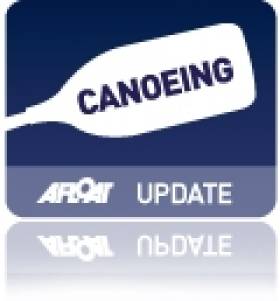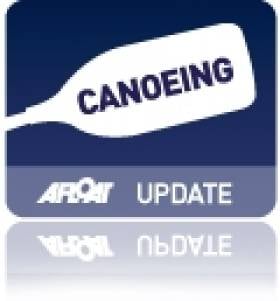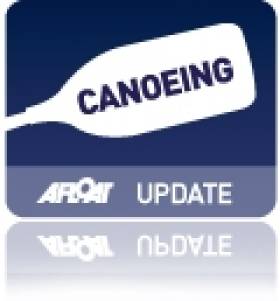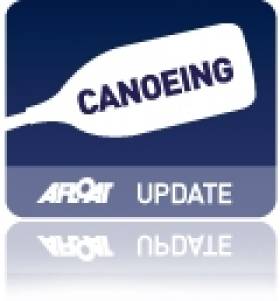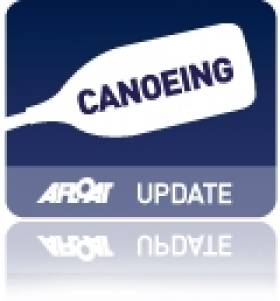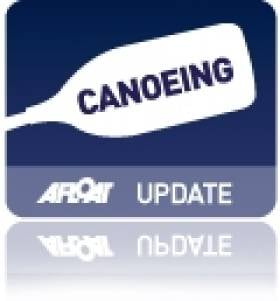Displaying items by tag: circumnavigation
Shooter Completes Solo Circumnavigation of Ireland by Kayak
Well-wishers broke out the champagne to welcome home Elaine 'Shooter' Alexander as she completed her solo circumnavigation of Ireland by kayak yesterday.
The first woman from Northern Ireland to complete such a feat, Shooter landed at County Antrim Yacht Club 71 days after setting off from the same spot on her 1,000-mile challenge to raise funds for local charity SHARE.
Shooter's skills were regularly tested to the limit. On one occasion she suffered severe sea sickness after getting caught in a large swell during a 12-mile crossing near Brandon Bay.
“I was fully committed with a cliff face on one side and a long paddle to America on the other, so I had to continue despite being severely ill,” she said.
But the challenge wasn't all doom and gloom. One highlight was when Shooter was joined by a pod of six dolphins for over an hour near Easkey on the Sligo coast. And above all, the people she met along the way have left a lasting impression.
“The support from the kayaking community and local fisherman has been great," she said. "Kayakers have paddled stretches with me, met me with tea and biscuits, gave me warm beds and hot showers, shared invaluable local knowledge – I can’t thank them enough."
Shooter Nears the Finish Line in Solo Kayak Challenge
Elaine 'Shooter' Alexander is set for hero’s welcome this week as she becomes the first woman from Northern Ireland to circumnavigate the island of Ireland by kayak.
The solo paddler is expected to reach the finish line at County Antrim Yacht Club on Wednesday after her 70-plus-day test of endurance.
Shooter began her epic 1,000-mile voyage on 3 May, facing a tough challenge navigating a coastline of cliffs and headlands, strong tides and brutal weather. She has been storm-bound for a total of 21 days, often only with a small tent for shelter.
When asked what home comfort she was most looking forward to, she simply replied: "A proper toilet and some clean clothes."
Shooter embarked on the challenge to raise funds for SHARE, a charity providing outdoor activity programmes that promote the inclusion of disabled and non-disabled people.
“I expected and had trained for the physical challenge but I don’t think you can ever prepare mentally," she commented.
"It has been a real struggle coping with the repetition of paddling, getting changed into wet clothes and packing up a wet tent every day. Especially on the windy days it has been hard just to push on that extra few miles each day.”
But connecting with fans and supporters through social media made a big difference.
“The Facebook page has really been a lifeline," she said. "There is nothing more motivating than coming off the water after a tough day to read so many supportive and funny comments from well wishers."
See below for a map showing Shooter's live position as she edges closer to the finish line.
New Doco on Record-Breaking Kayak Voyage Round Ireland
As Elaine 'Shooter' Alexander continues her challenge to be the first woman to circumnavigate Ireland solo by kayak, news comes of a documetary on another recent kayak voyage.
British adventurers Jeff Allen and Harry Whelan recently completed their own circumnavigation of Ireland, breaking the previous record by eight days.
The duo's exploits were captured by filmmaker Vaughan Roberts for 'Into the Wind', which documents their epic 25-day voyage. A trailer for the new film can be seen here:
Shooter Hits Tramore Three Weeks Into Kayak Challenge
Elaine 'Shooter' Alexander has now reached Tramore on the south-east coast in her effort to circumavigate the island of Ireland by kayak.
Now three weeks into her solo voyage to raise funds for Share, which works for the inclusion of disabled people in water-based and other activities, Shooter is edging ever closer to the half-way point of her 1,000-mile route.
See below for a map of Shooter's current position.
Shooter Passes Dublin on Solo Kayak Challenge
laine 'Shooter' Alexander has already passed Dublin in her challenge to circumnavigate Ireland by kayak.
Just 10 days into her solo voyage to raise funds for charity and Elaine has already reached Greystones in Co Wicklow.
But she still has a long way to go to complete the 1,000-mile route battling tides, headlands, cliffs and unpredicatable weather.
See below for a map showing Shooter's current position.
Shooter Gets Ready to Kayak Round Ireland
Monaghan's Elaine 'Shooter' Alexander will soon begin her challenge to be come the first Northern Irish woman to circumnavigate the island of Ireland by kayak, the OutdoorNI Adventure Blog reports.
On 3 May she will set off from the newly refurbished County Antrim Yacht Club at Belfast Lough on a 1,000-mile trek that's expected to take two months to complete.
Alexander will be paddling clockwise around Ireland, taking on tides, cliffs, headlands - and Ireland's unpredicable weather.
The Ulster woman has been training since last year for the challenge, which is intended to raise funds for the Fermanagh-based SHARE, a charity that brings together disabled and non-disabled people in arts and outdoor-based activities.
“Last year I paddled around Ulster which took 26 days and prepared me for some of what to expect for this expedition," says the competitive kayaker, who represented Northern Ireland twice at the Surf Kayak World Championships.
'Shooter' will also be posting regular updates of her trip on Facebook, Twitter and YouTube. Details on this as well as how to donate are available on her website www.canoearoundireland.com.
The OutdoorNI Adventure Blog has more on the story HERE.
Replica 600 BC Ship Returns Triumphant After 20,000 Mile Circumnavigation of Africa
Phoenicia was built using traditional Phoenician construction methods and materials, and designed using evidence from shipwrecks and archaeological finds. Advice from scholars ensured she was completely authentic, but on the inside she was equipped with the latest high tech electronic navigational equipment from Raymarine.
The journey was completed in two stages. The first saw Phoenicia depart from Syria in Summer 2008 and sail East as far as Yemen. After a short break, she completed her circumnavigation past Oman and Mozambique, around the Cape of Good Hope, out to the Azores, and through the Straits of Gibraltar via Tunisia, Malta and Lebanon to her final port of Arwad, where she arrived to a crowd of over 2,000 well wishers on 23rd October. The homecoming was celebrated with a gala dinner held at Tartous.
Phoenicia was fitted out with a Raymarine C80 multifunction display, GPS antenna, Automatic Identification System (AIS) receiver,, ST60+ tridata, wind system and repeater, DSM300 fish finder and Raymarine LifeTag wireless man overboard system. The systems worked flawlessly, despite facing severe conditions during the expedition including seven-metre waves and gale force winds. Having accurate navigational data also ensured Phoenicia could make the necessary detours to avoid dangerous areas prone to pirate attacks.
The Phoenicia expedition (www.phoenicia.org.uk) was conceived by Philip Beale, a former British Royal Naval Officer and entrepreneur. It is being featured in a national television documentary 'Ancient Worlds' to be shown on BBC2 in the autumn.


























